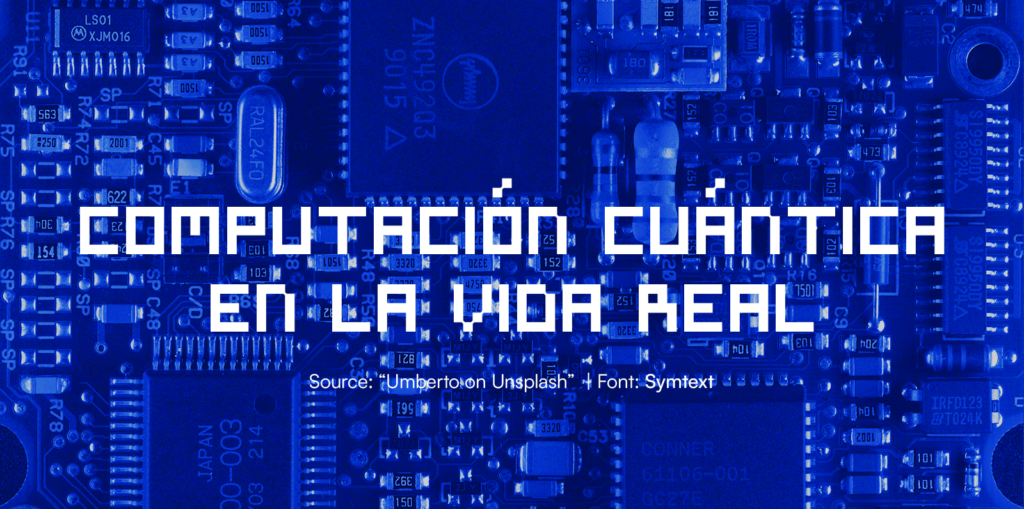It’s likely that the term “quantum computing” gives you chills. It combines everything related to the daunting world of programming with the dense and complex theory of quantum mechanics. Certainly, it’s not easy to grasp. Both disciplines stand tall in the realms of science and data as some of the most challenging to master. As physicist Richard Feynman paraphrased Niels Bohr: “If you think you understand quantum mechanics, you don’t understand quantum mechanics.”
However, in a world immersed in technological progress, there seems to be no other choice but to hop on the innovation train and finally make peace with all these concepts that feel so distant. Terms like quantum computing are now part of our everyday vocabulary, and their presence in various sectors is increasingly evident. And it’s not just hearsay—data backs it up: economic investment in quantum computing is growing, and more projects related to this discipline are emerging, alongside platforms that support its implementation, resources promoting its use, and educational initiatives aimed at creating specialists in the field.
So, what exactly do we mean by quantum computing? Specifically, it refers to all information processing carried out under a quantum framework. To simplify this definition, the key difference between classical and quantum computing lies in the unit of information they use: the traditional bit, which can have a value of 0 or 1, is now the qubit, which can represent both values simultaneously, as if one were superimposed on the other. As you can imagine, this allows quantum computers to process information much faster and more efficiently.
But don’t think this is about replacement or substitution! Quantum computing acts more as a fantastic complement to traditional computers, providing them with valuable advantages in numerous industries, such as faster calculations, efficient simulations, improved precision in web searches, enhanced security while browsing, and the gradual acquisition of machine learning capabilities.
All these qualities make quantum computing a versatile resource capable of improving performance and productivity across many sectors, revolutionizing them and driving unprecedented growth. Key industries benefiting include healthcare and science, quantum biology, the environment, aerospace transportation, logistics, and cryptography.
HEALTHCARE AND SCIENCE
In healthcare, quantum computing is expected to enable significant advances in personalized therapies, helping to develop treatments tailored to individual patient conditions. It also promises substantial benefits in detailed DNA analysis and the structural study of multiple proteins.
In science, quantum computers are anticipated to be instrumental in simulating the internal structure of nitrogen, which could reduce the energy costs associated with current fertilizers.
QUANTUM BIOLOGY
Integrating quantum computing into biological studies could lead to a better understanding of processes like photosynthesis and the echolocation abilities of certain birds. It can also be applied to molecular simulations, modeling the behavior of ecosystems or populations, and making future forecasts for these sectors.
ENVIRONMENT
In environmental applications, quantum computing could benefit climate modeling by making more accurate weather predictions, monitoring air and water quality, and even optimizing energy use. It could enhance the efficiency of power grids and plan the consumption of renewable energy resources.
AEROSPACE TRANSPORTATION
In aerospace research, quantum computing might represent a breakthrough. Its highly efficient simulation capabilities could aid in developing new materials for astronaut suits, satellite devices, and rockets. It may even play a significant role in traditional transportation, improving processing times for certain tasks in autonomous vehicles.
LOGISTICS
Quantum computers could revolutionize the logistics sector by solving complex real-time optimization problems and improving efficiency across the entire supply chain.
CRYPTOGRAPHY AND SECURITY
Finally, cryptography and security are two areas where major improvements are expected, particularly in sectors that handle massive amounts of data where breaches could cause significant issues. An example of this is the banking industry. Quantum computing could introduce much safer methods by utilizing more complex processing to encrypt critical information.
As you can see, despite the initial unease that comes with hearing about quantum computing, its integration into multiple sectors is practically undeniable. From advancements in personalized therapies to optimizing power grids, quantum computing positions itself as a powerful technology poised to revolutionize how we tackle challenges in the digital age. Its role will be pivotal in the next wave of innovation. Luckily, now you’re a bit more prepared to face it!




